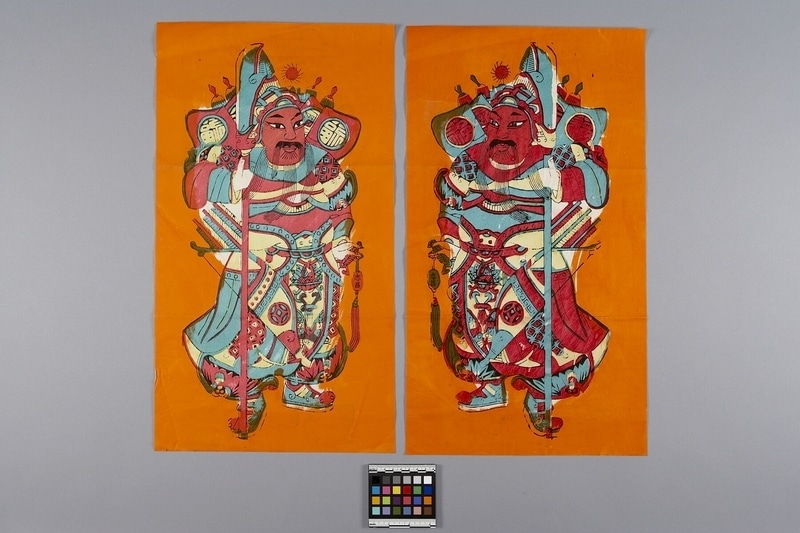Military Door Gods with Guandao Item Number: Edz988 a-b from the MOA: University of British Columbia

Description
Pair of rectangular papers, each printed in black outline, with an armed door god (wu menshen; 武門神), a general with a guandao pole weapon (立刀將軍) in red, yellow, and blue-green. Faces are red, background is orange. White paper left in some areas. Overlap of blue-green and orange produces olive in some places. Figures are 49 cm high. Figure on part a is wearing a green skirt, figure on part b is wearing a red skirt. The Chinese character福 (fu, fortune) appears on the two fluttering flags behind their shoulders, and The name of the printing shop, 志昌 (zi3 coeng1/ Zhì chāng) appears on their hanging ornament.
History Of Use
Known as menshen (门神, door gods), they are considered to protect homes from evil spirits. Prints depicting them are usually displayed on the door inside and outside the house during the Chinese Spring Festival (春节) or Lunar New Year. Such prints are thus known as nianhua (年画, new year pictures). Military door gods would be displayed on the external doors of the home. They are also used on doors of temples and ancestral halls.
Iconographic Meaning
Military Door Gods with Guandao (立刀將軍). Also known as Door Gods Guangong (關公門神, Guangong menshen), some people believe that this type of door god derives from the character in Water Margin (Shuihu zhuan, 水滸傳), Guan Sheng (関勝) who uses a large broadsword (大刀). As they carry flags with the Chinese character福 (fu, fortune), they are often called Fu Flag Broadsword Generals (福旗大刀將軍, fuqi dadao jiangjun). As this pair of prints displayed for the new year has the Chinese character福 (fu, fortune) on them, these door gods are believed not only to ward off evil spirits, but also to bring blessings.
Item History
- Made in Tsuen Wan, Hong Kong, China before 1976
- Collected between 1967 and 1976
- Owned by Graham E. Johnson before March 9, 1977
- Received from Graham E. Johnson (Donor) on March 9, 1977
What
- Name
- Military Door Gods with Guandao
- Identification Number
- Edz988 a-b
- Type of Item
- Manufacturing Technique
- machine made ?, woodblock printed and stencilled
- Overall
- height 53.2 cm, width 30.1 cm
Who
- Culture
- Chinese
- Previous Owner
- Graham E. Johnson
- Received from
- Graham E. Johnson (Donor)
Where
- Holding Institution
- MOA: University of British Columbia
- Made in
- Tsuen Wan, Hong Kong, China
When
- Creation Date
- before 1976
- Collection Date
- between 1967 and 1976
- Ownership Date
- before March 9, 1977
- Acquisition Date
- on March 9, 1977
Other
- Item Classes
- works on paper
- Condition
- good
- Accession Number
- 0366/0015